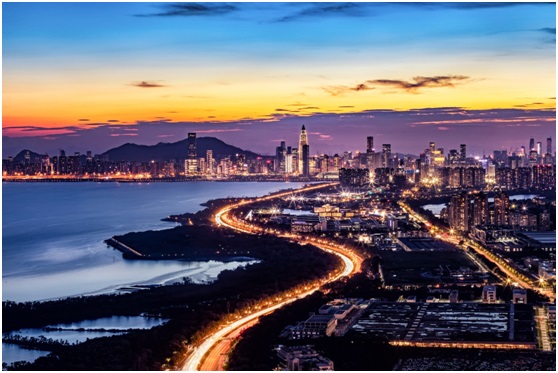By Wang Wenwen of Global Times
For the first time in history, the economy of Shenzhen surpassed that of Hong Kong, with Shenzhen’s 2018 GDP growth rising 7.6 percent to 2.42 trillion yuan ($362.2 billion) compared with Hong Kong’s HK$2.845 trillion, equivalent to 2.4 trillion yuan based on the annual average exchange rate given by Hong Kong’s Census and Statistics Department.
Above picture: night scene of Shen Zhen and Greater Bay Area. ——CFP
The competition over GDP between Hong Kong and its neighboring dynamic rival on the Chinese mainland has been a hotly debated issue in China’s economic realm. Shenzhen, one-third the size of Shanghai and one eighth that of Beijing, has come a long way from a small hamlet of fishermen to a hub for innovation-driven industries. The transformation of this metropolis is attributed to the country’s reform and opening-up, followed by a flow of talent, enduring struggle and hard work.
Hong Kong, losing its crown to Shenzhen, has seen its glory and competitiveness waning over the past two decades.
The spirit of Shenzhen has helped drive the Chinese economy forward. As the forerunner of China’s special economic zone experiment, Shenzhen has become a cradle for private economic growth and aims to become a world technology innovation center.
China today continues deepening reforms and readjusting the industrial structure. So is Shenzhen. In a bid to promote the efficient flow of capital, resources, talent and information between Guangdong, Hong Kong and Macao, Shenzhen is trying to coordinate transport and planning in the two special administrative regions located in the Guangdong-Hong Kong-Macao Greater Bay Area.
Shenzhen is a successful model for China’s economic development. However, it also faces multiple challenges. As the world’s leading technological frontier, Shenzhen still needs the financial support of Hong Kong. Meanwhile, the Hong Kong SAR government also needs to integrate with the Greater Bay Area.
The Greater Bay Area project envisions better connectivity for China’s industries. To make it work, China needs to bridge the differences of the three regions: currency, trade policies, taxation and payment systems, to name just a few.
The Greater Bay Area will drive the economy of China and even the world and become a new highlight for the China-proposed Belt and Road Initiative that aims to boost connectivity across the world.










Leave a Comment